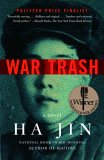Summary | Excerpt | Reading Guide | Reviews | Readalikes | Genres & Themes | Author Bio

Critics' Opinion:
Readers' Opinion:
First Published:
Oct 2004, 368 pages
Paperback:
May 2005, 368 pages
2. Our Collapse South Of The Thirty-Eighth Parallel
The fourth-phase offensive had just ended two months ago in February; I wondered why we were starting the fifth one so soon. Common sense dictates that the success of a large battle depends on the buildup of supplies and munitions and on the thorough preparation of troops. Although several field armies had just arrived from interior China, most of the men were bone-weary from the arduous trek and unfamiliar with the foreign climate and terrain, let alone the nature of the enemy we faced. We were told that this offensive would wipe out ten American and Korean divisions and drive all the hostile forces to the south of the Thirty-seventh Parallel. In our superiors' words, "We're going to eliminate some of their unit designations." I had misgivings about that because our equipment was far too inferior, but I didn't reveal my thoughts to anyone. For the time being my job was to help Chang Ming edit the bulletin. Ming had graduated from Beijing University and majored in classics, for which he was well respected, even by higher-ranking officers. He also knew English but couldn't speak it fluently. I spoke the language better than most college graduates because in my teens I had attended classes taught by an American missionary in my hometown.
On the evening of April 22, 1951, suddenly thousands of our cannons, howitzers, mortars, and Katyusha rocket launchers began bombarding the enemy's positions; thus started the fifth-phase offensive. As usual when the Chinese forces unleashed a major attack, a full moon hung in the sky, ready to facilitate our men's night fighting. Our Sixtieth Field Army, composed of the 179th, 180th, and 181st Divisions, was assigned to attack the Turkish Brigade and the U.S. Third Division, both positioned in front of us. The battle proceeded so smoothly that our divisional leaders were bewildered-in just one day we advanced more than ten miles without encountering any serious resistance. Why didn't the enemy engage us? Had they been overwhelmed by our bombardment? Or were they just eluding us? Or was this a ruse to lure us farther south? Our superiors had their doubts, but neither Commander Niu nor Commissar Pei, who lacked the requisite training and experience of senior officers, could guess what was happening. They just executed the orders issued by headquarters. As a rule, without approval from higher up, they were not allowed to order troop movements. This restriction, leaving no room for the officers' own initiative, directly contributed to our later defeat.
We stayed put for several days and didn't go farther into enemy-occupied territory. A week later when the second stage of the offensive started, most of the Chinese and the North Korean troops swerved east to attack the South Korean army. Our division's task was to wedge ourselves between the American and the South Korean forces, specifically to prevent the U.S. First Marine and Seventh Divisions from moving east to reinforce the South Koreans. We occupied the hills south of the Han River, whose water wasn't deep in spite of its swift current, and thanks to the favorable terrain we held our position for five days. The two American divisions didn't break our defense line, though they were superior in both firepower and number.
By now, most of the Chinese and North Korean field armies were thrust deep inside enemy-occupied territory; some had pushed forward seventy miles south of the Thirty-eighth Parallel. Then the order came for all units to stop attacking. Obviously the operation had gone awry. The truth was that our field armies had advanced so fast and so deep that our supply lines had crumbled. Apart from the logistical disaster, our men on the front had suffered heavy casualties. The enemy had adopted "magnet tactics"-whether we attacked or retreated, they would always remain close enough to inflict casualties on our forces. This time they dragged our troops deep into South Korea, cut their connections with the echelons, isolated and encircled them, and tried to annihilate them. Apparently the enemy had gained the upper hand, so the Headquarters of the Chinese People's Volunteer Army had to call off the offensive. Most of the line officers had no idea of the situation, and some even assumed we had won a victory. I came to know of the truth because I often served as a secretary at the meetings at which our divisional leaders discussed plans of action.
Excerpted from War Trash by Ha Jin, chapter 1 and part of chapter 2 (pages 6-20) of the hardcover edition. Copyright© 2004 by Ha Jin. Excerpted by permission of Pantheon, a division of Random House, Inc. All rights reserved. No part of this excerpt may be reproduced or reprinted without permission in writing from the publisher.





The House on Biscayne Bay
by Chanel Cleeton
As death stalks a gothic mansion in Miami, the lives of two women intertwine as the past and present collide.

The Flower Sisters
by Michelle Collins Anderson
From the new Fannie Flagg of the Ozarks, a richly-woven story of family, forgiveness, and reinvention.

The Funeral Cryer by Wenyan Lu
Debut novelist Wenyan Lu brings us this witty yet profound story about one woman's midlife reawakening in contemporary rural China.
Your guide toexceptional books
BookBrowse seeks out and recommends the best in contemporary fiction and nonfiction—books that not only engage and entertain but also deepen our understanding of ourselves and the world around us.